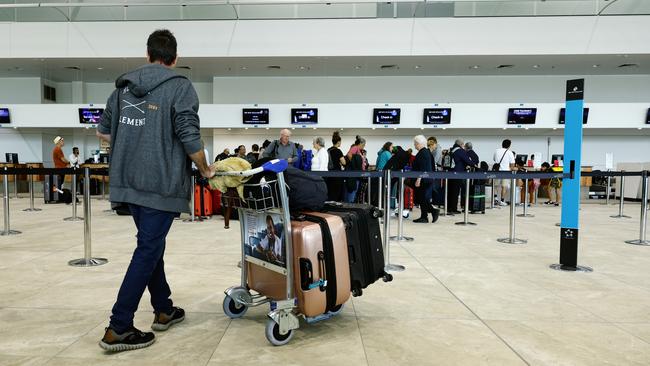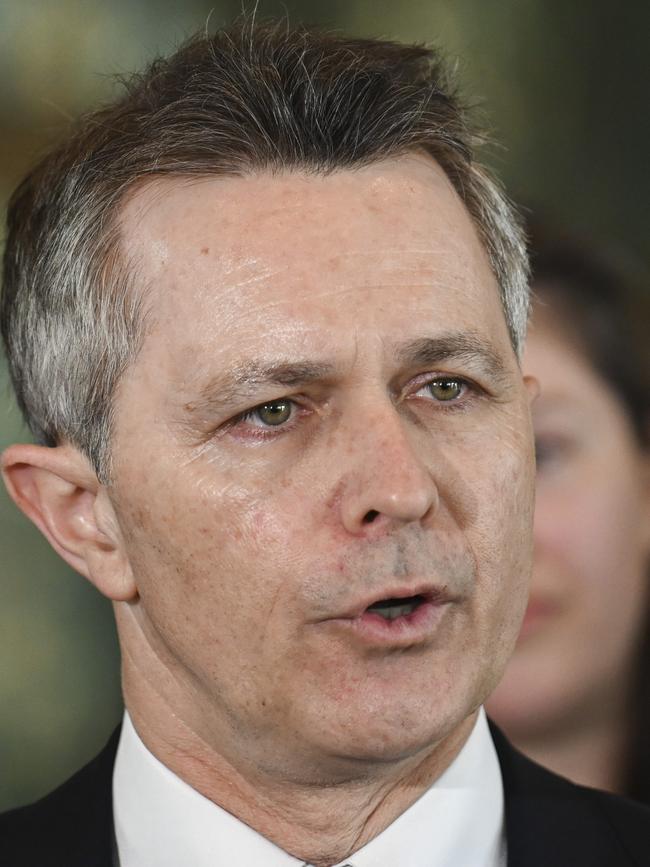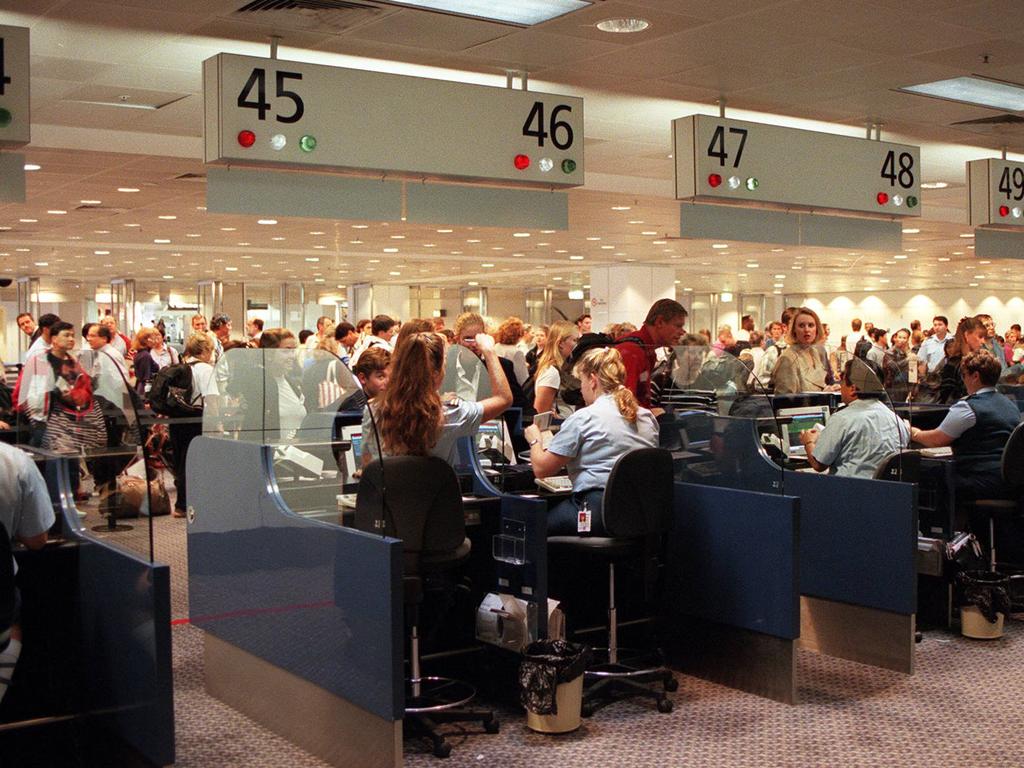Foreign students are finding ways to prolong their stay despite a visa crackdown
The Albanese government is desperate for foreign students to head for the exit gates, as Peter Dutton calls visa hoppers the ‘modern version of boat arrivals’.

The annual net influx of foreign students, backpackers and workers reached a peak of 560,000 in the year to September last year and Labor is desperate to shave 300,000 off that unwanted record by June next year. Yet young foreigners keep arriving in solid numbers to study and work, and not enough of those who were expected to depart by official forecasters are going home.
Anthony Albanese and his cabinet have executed a messy handbrake turn on international students since winning office in 2022. Initially, as higher education expert Andrew Norton has documented, Labor tried to pull international education out of its Covid slump. It ratcheted up the granting of student visas by 40 per cent over its pre-pandemic peak; extended by two years the time a person on a temporary graduate visa could stay if they took one of the thousands of courses the government nominated.
It also wound back what was a crisis-era unlimited amount of hours a foreign student could work to a cap of 48 hours a fortnight during term.

But, as the professor in the practice of higher education policy at the Australian National University’s POLIS: The Centre for Social Policy Research explains, a year ago Labor changed its mind, with a steady run of policy moves inflicting “blow after blow on the international education industry”, most of which made it more difficult and costly to obtain a student visa. Refusal rates for offshore student visa applications have increased, while a ministerial directive effectively put a handbrake on processing for universities and students with the highest risk rating.
In an August paper for ANU’s Migration Hub, Norton argues “the reasons for this change of direction are mixed”.
“Some government policy shifts tackle problems that the international education industry generally acknowledges, including students primarily motivated by earning money rather than studying, and English language proficiency,” he writes.
“Other policies are new means of pursuing an old policy goal, encouraging international students to meet Australia’s labour force needs. To these the government has added a new policy objective, reducing Australia’s population. Pressure on accommodation and other services is cited as a reason.”
At the end of August, there were more than 900,000 foreigners here on a temporary student or graduate visa, or 200,000 more than the pre-Covid peak. “This is why the government has decided to slow down arrivals and speed up departures,” Norton writes.
One of the blunt tools Labor has reached for, against the advice of many without a vested interest, is the imposition of a cap on foreign students in higher education and vocational training.
Even the Reserve Bank board expressed its concerns last month about the ploy and wondered how it would affect inflation. “Lower numbers of international student arrivals would be likely to reduce aggregate demand (including for housing), but also lower growth in population and therefore the economy’s supply capacity,” the RBA board said in the minutes of its policy meeting.
Norton argues the prudent course would have been for a “period of pause and reflection” to see how the suite of demand squeezes played out, not the poorly thought-through caps that will harm the sector, mistreat students and academics, and damage the nation’s reputation.
It appears almost certain that new international student numbers will be capped at 270,000 next year after a Senate inquiry last week warned a portion of the spectacular recovery in foreign enrolments “has been driven by non-genuine students and unscrupulous providers”. “In the long term, these issues have the potential to damage Australia’s reputation,” the report says.
The Senate committee backed unprecedented powers for Education Minister Jason Clare to cap enrolments and set quotas for every university and training provider “to ensure the quality and integrity of the international education sector”.

It did not support a provision to give Clare course-level control over the more than 25,000 courses foreigners currently can choose from; Norton argues better parliamentary scrutiny of the way caps are set is required. The Coalition supports student caps in principle to maintain education quality for local students and to quell the people boom but takes issue with many of the proposals it believes will harm providers.
Norton argues we’re at a major turning point in higher education. “This bill, in combination with planned controls on domestic student enrolments, signals the demise of student choice and university autonomy,” he wrote in The Conversation last week when the Senate report was tabled. “A new era of bureaucratic control from Canberra is arriving.”
One of the practices Labor wanted to curb was onshore “visa hopping”, where a student moves from visa to visa, extending their stay and hoping to eventually gain permanent residency via a flawed “points system” that favours such behaviour. This usually leads to the limbo of “permanent temporariness”, and as Martin Parkinson’s migration review found, undermines the integrity of the visa system.
One-third of those on graduate visas were seeking to prolong their stay in Australia through another student visa. New research from the nonpartisan e61 Institute shows visa hoppers are typically low-skilled migrants from low-income countries such as Nepal, Pakistan, and Bangladesh.
Authors Silvia Griselda and Harshit Shah found during their time as graduate visa holders, visa hoppers earn 20 per cent less than other graduate visa holders and 10 per cent less than other graduate visa holders in the same occupation.
In March, the government implemented the Genuine Student requirement to stop people from hopping from student visa to student visa unless there is credible course progression. Then from July 1 it banned visitor and temporary graduate visa holders from applying for student visas onshore.
As well, to end the loopholes that allow some graduates to stay indefinitely, Labor introduced significantly shorter post-study work rights, reduced age limits from 50 to 35, and increased English-language requirements.
The e61 authors conclude that the ban on visa hopping could actually raise the average quality of the pool of prospective migrants.
“In the long run, these higher-quality migrants could have a significant fiscal impact in Australia and help achieve the goals of the country’s permanent migration system,” they write.
But a dynamic migration system replete with loopholes, rorts, exploitation and perversities will continually throw up a new series of policy challenges. The rate of overseas departures (that is, foreigners and Australians) has barely changed, stuck at around 50,000 a quarter, while the government was expecting that to be 75,000 a quarter.
The total number of students and graduates here on temporary visas has not budged since the tightening of rules in March but there has been a 40 per cent jump in the number of foreigners here on bridging visas; there are now 324,000 waiting for a decision on another visa application and the number is growing.
Figures supplied to the Senate last week show that in the eight months to August, there have been more than 13,000 new cases challenging student visa refusals at what is now known as the Administrative Review Tribunal. That’s triple the number across the same period in 2019, or more than the entire case load across the past four calendar years.
From January to August there have been more than 3000 asylum claims by people whose last substantive visa granted was a student visa, with more than 500 lodgements in August alone. Not one to let an opportunity slip by without a cut-through and incendiary gibe, Peter Dutton has called visa hopping “the modern version of the boat arrivals”.
The Prime Minister is in the wars on several fronts, not least around the purchase of his Copacabana eyrie. But that’s neither here nor there for the coming election campaign, where the cost-of-living crisis from high and persistent inflation, stagnant living standards, failing school performance, dearth of affordable housing for our young, ailing aged care and health systems, perilous energy transition and mismanaged migration will dominate the policy contest.
Rather than panicky moves that catch people by surprise and hurt successful export industries, Labor should get cracking on a new points test for permanent migrants, plan the intake over a longer time horizon, prioritise foreign workers to build homes, and work quickly with local governments and the states to populate our much-ignored regions and towns. Instead, we’re doubling down on toil and trouble.







The Albanese government’s relentless crackdown on international students is driven by the brutal politics of the population boom rather than best-practice education, trade or economic policy. If it works, the pain will be spread far and wide, and new sources of migration turmoil are guaranteed.